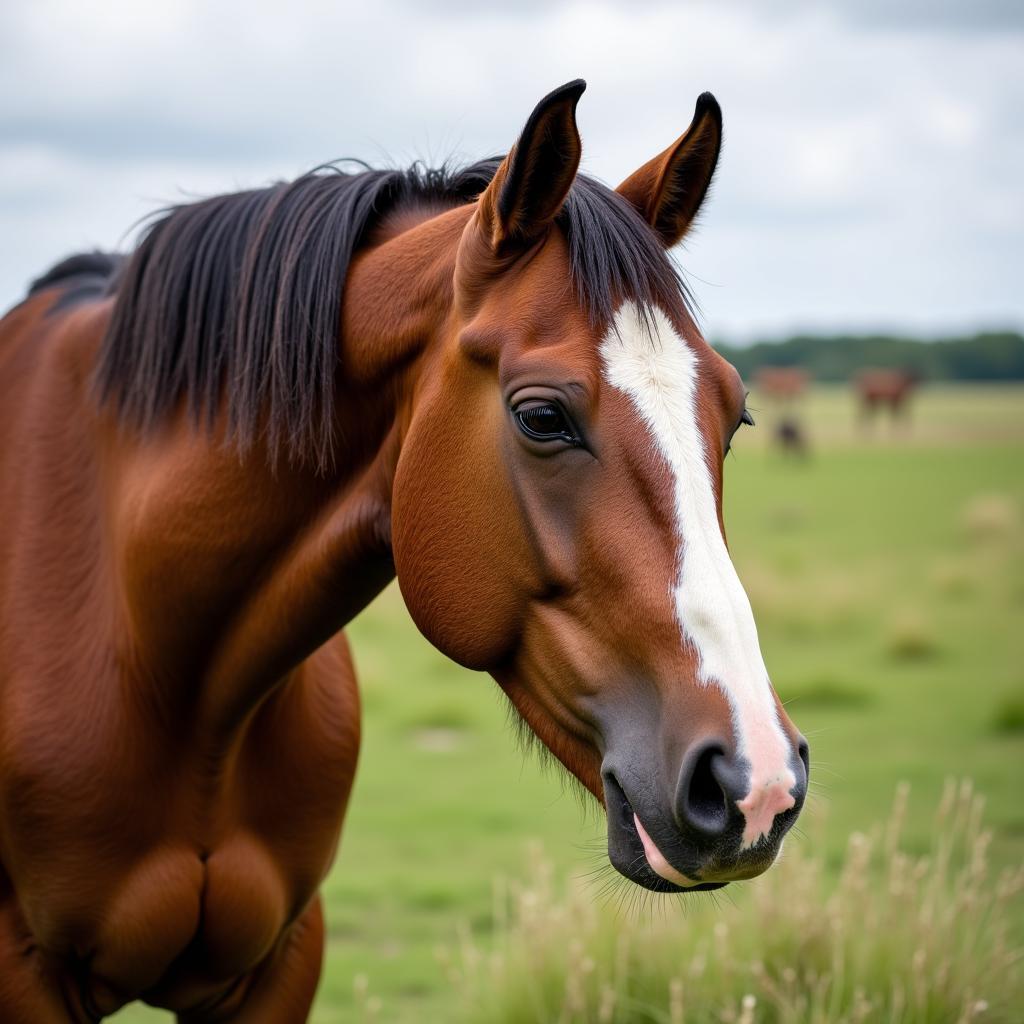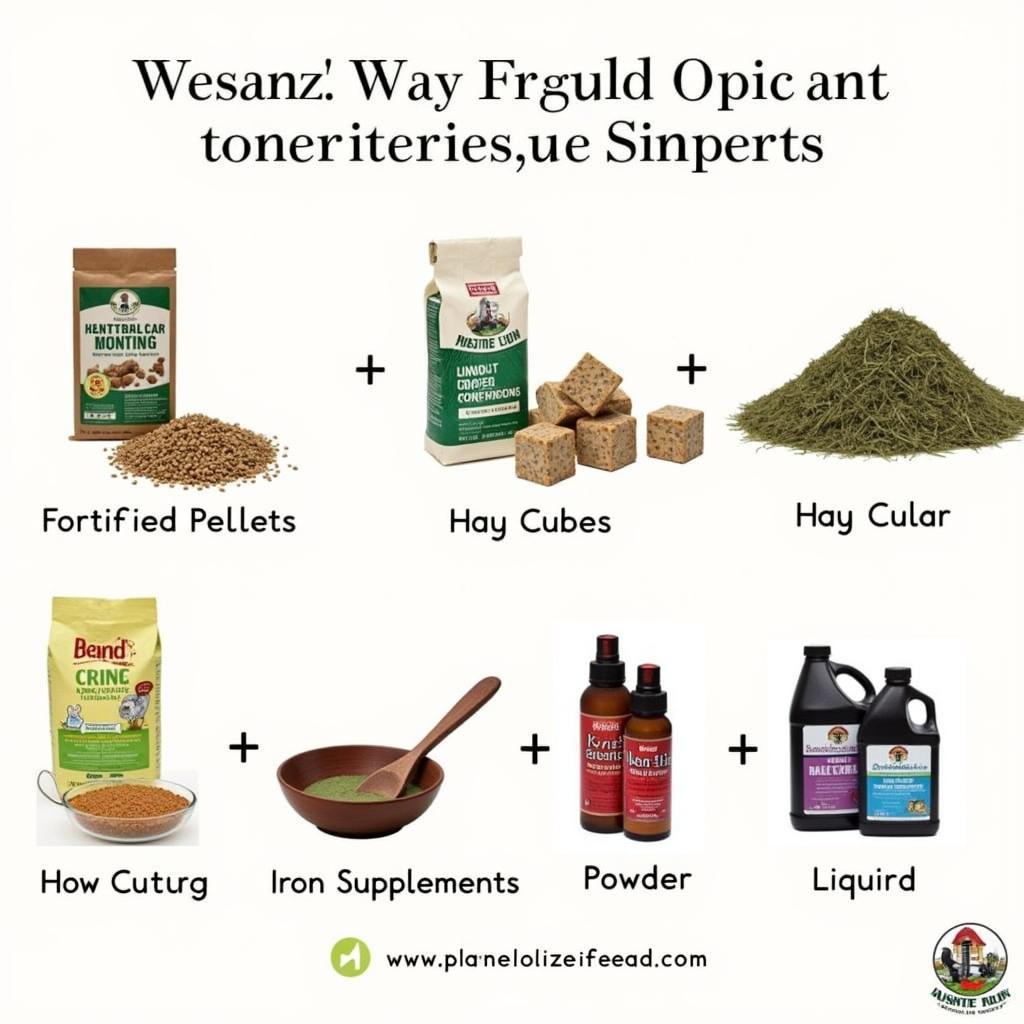Horse Iron is a crucial mineral for maintaining the health and well-being of your equine companion. It plays a vital role in various bodily functions, including oxygen transport, red blood cell production, and overall energy levels. Ensuring your horse receives adequate iron is paramount for their optimal performance and vitality.
The Importance of Iron in Horses
Iron deficiency, also known as anemia, can lead to a range of health issues in horses. Symptoms can include lethargy, weakness, poor performance, pale gums, and increased susceptibility to infections. Understanding the role of iron and how to manage it effectively is essential for every horse owner.
Horses obtain iron primarily through their diet, which ideally consists of good quality forage like hay and pasture. However, the iron content in forage can vary depending on soil conditions and other factors. Therefore, it’s important to be aware of the potential for iron deficiency, especially in certain groups like growing foals, pregnant mares, and performance horses.
Signs and Symptoms of Iron Deficiency
Recognizing the signs of iron deficiency early on is crucial for prompt intervention and preventing further complications. While some symptoms can be subtle, others are more pronounced. Look out for the following:
- Lethargy and decreased energy levels
- Reduced athletic performance and stamina
- Pale gums and mucous membranes
- Rapid heart rate and breathing
- Poor coat condition
- Increased susceptibility to infections
 Horse showing signs of iron deficiency: lethargy and pale gums
Horse showing signs of iron deficiency: lethargy and pale gums
Managing Horse Iron Levels
Maintaining adequate horse iron levels requires a balanced approach that considers diet, supplementation, and regular monitoring. Working closely with your veterinarian is recommended to determine the best course of action for your individual horse.
Dietary Sources of Iron
Forage is the foundation of a horse’s diet and should provide a significant portion of their iron intake. However, if forage alone is insufficient, supplemental iron may be necessary. Common iron supplements for horses include ferrous sulfate, ferrous fumarate, and chelated iron.
“Ensuring your horse’s diet includes quality forage is the first step in managing their iron levels,” says Dr. Emily Carter, Equine Nutritionist at Justus Horses USA. “Forage provides the most natural source of iron, and a balanced diet is key to overall equine health.”
 Various types of iron-rich horse feed and supplements.
Various types of iron-rich horse feed and supplements.
Iron Supplementation
While supplementation can be beneficial, it’s important to avoid over-supplementation, as excessive iron can be toxic. Always consult with your veterinarian before adding any supplements to your horse’s diet. They can help you determine the appropriate type and dosage based on your horse’s individual needs and current iron levels.
“Over-supplementation can be just as harmful as deficiency,” warns Dr. John Miller, DVM, specializing in equine internal medicine. “Regular blood tests are crucial for monitoring iron levels and adjusting supplementation accordingly.”
Monitoring Iron Levels
Regular blood tests are the most effective way to monitor your horse’s iron status. These tests measure various parameters related to iron metabolism, such as hemoglobin, hematocrit, and serum iron levels. Your veterinarian can interpret these results and recommend any necessary adjustments to your horse’s diet or supplementation regimen.
Conclusion
Horse iron is essential for maintaining their overall health and performance. Understanding the signs of deficiency, managing iron levels through diet and supplementation, and regular monitoring are crucial for ensuring your horse receives the appropriate amount of this vital mineral. By working closely with your veterinarian and prioritizing a balanced nutritional approach, you can help your horse thrive. Remember, proper horse iron management contributes significantly to a long, healthy, and active life for your equine companion.
FAQ
- What are the primary sources of iron for horses? Forage, such as hay and pasture, are the primary sources of iron. Supplements can be added if needed.
- How can I tell if my horse is iron deficient? Signs include lethargy, pale gums, poor performance, and increased susceptibility to infections.
- What are the risks of over-supplementation? Excessive iron can be toxic. Always consult your vet before supplementing.
- How often should I have my horse’s iron levels checked? Your vet can recommend an appropriate schedule based on your horse’s individual needs.
- What types of iron supplements are available for horses? Common options include ferrous sulfate, ferrous fumarate, and chelated iron.
- Can iron deficiency be treated? Yes, with appropriate dietary changes and/or supplementation under veterinary guidance.
- Is iron deficiency more common in certain horses? Yes, it’s more common in growing foals, pregnant mares, and performance horses.
Need more information? Check out these related articles on our website: “Equine Nutrition 101” and “Common Horse Health Concerns.”
For further assistance, please contact us: Phone: 0772127271, Email: [email protected], or visit us at: QGM2+WX2, Vị Trung, Vị Thuỷ, Hậu Giang, Việt Nam. We have a 24/7 customer support team.